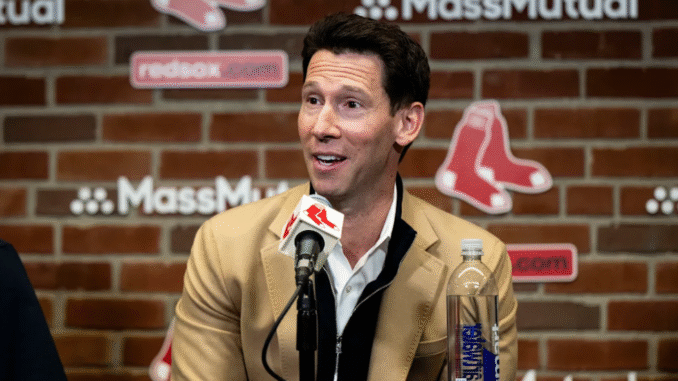
Craig Breslow’s Tenure So Far: Where the Red Sox Got It Wrong
When the Boston Red Sox brought Craig Breslow on board to run their front office in October 2023, the hope was clear: rekindle the franchise’s competitive fire. A key piece of the club’s 2013 World Series-winning team, Breslow was expected to blend his Ivy League education, 12-year MLB career, and analytical savvy to usher in a new era of success.
Instead, nearly a season and a half into his tenure, the Red Sox have been stuck in mediocrity—hovering around .500, at best.
Breslow was billed as the next big thing in front office leadership—a former player with both the intellect and intuition to succeed. But reality hasn’t matched the hype. Criticized for being cold and mechanical in his approach—an impression reinforced by reports that Boston relied heavily on AI-assisted interviews in its hiring process—Breslow’s leadership has left fans and insiders with more questions than confidence.
The controversial trade of Rafael Devers has become the defining misstep of Breslow’s early tenure, seen by some as a move so damaging it should cost him his job. While not all the Red Sox’s recent failures fall on Breslow’s shoulders, he’s made a number of decisions that have worsened already fragile situations.
Here are four key expectations the Red Sox misjudged under Craig Breslow:
1. Communication Breakdown
The Devers debacle stands out as the clearest example of failed communication, but it’s far from the only one. While Breslow wasn’t the architect of Devers’ 10-year, $313.5 million extension, the organization made a long-term commitment to him as the franchise cornerstone. That should’ve made him a priority in any major personnel decision.
Instead, Breslow blindsided Devers by signing Alex Bregman—another All-Star third baseman—without looping in the team’s existing star. While MLB doesn’t typically grant players the power NBA or NFL stars enjoy in personnel matters, it’s reasonable to expect some level of communication with your franchise player before adding someone who plays his exact position.
The fallout was predictable. Tensions flared, trust eroded, and the situation unraveled. Whether it was arrogance, oversight, or poor leadership, someone needed to talk Breslow out of that move—or at least ensure there was internal alignment before it happened.
2. A Lack of Emotional Intelligence
Breslow’s perceived detachment has become more than a media narrative—it’s an operational problem. The Devers-Bregman situation highlights the kind of misstep you’d expect from a pure analytics guy, not a former player who understands clubhouse dynamics.
MLB players—especially stars—spend their entire lives mastering their positions. Asking one to shift roles on a whim isn’t as simple as adjusting a depth chart in a spreadsheet. And yet, that seems to be how the move was handled.
Breslow should’ve known better. His peers in other front offices—like Buster Posey in San Francisco—demonstrate that emotional intelligence and communication can go hand in hand. When Posey’s Giants brought Devers in to play first base, the transition was smooth because trust was built first.
Boston, under Breslow, got that wrong.
3. Poor Strategic Planning
An effective executive thinks three moves ahead. They don’t just react—they build. Under Breslow, the Red Sox have too often looked like a team without a long-term plan.
Take second base, for example. With high hopes for prospects, Breslow handed 23-year-old Kristian Campbell the Opening Day job after just 19 Triple-A games. When Campbell inevitably struggled, the team had no veteran fallback. Now, he’s back in Triple-A, and the Red Sox are once again scrambling.
The issue isn’t just one position—it’s a broader failure to anticipate problems before they happen.
And then there’s the timing of the Devers trade. Breslow pulled the trigger on a blockbuster deal in mid-June—well before the trade market typically heats up. Why not wait? Why not spark a bidding war? It feels less like a strategy and more like an impulse.
The result? A team still searching for answers, stuck reacting instead of building toward a clear vision.
4. Wasting a Strong Talent Foundation
Over the past several years, the Red Sox have stockpiled impressive talent—only to squander it. From trading Mookie Betts to failing to surround promising young cores with the right veterans, Boston has repeatedly fallen short of maximizing its potential.
Some of that falls on ownership. John Henry’s attention has clearly drifted toward other ventures, including Liverpool FC, and the Red Sox have operated more like a mid-market team than a financial heavyweight.
But Breslow’s decisions threaten to repeat those mistakes. Rumors of shopping controllable players like Jarren Duran—just a year removed from an All-Star season—signal a dangerous willingness to sell low on talent.
At the same time, the club remains hesitant to part with prospects to improve the current roster. The Garrett Crochet trade was a step in the right direction, but one move won’t cut it.
If Breslow wants to break from the cycle of wasted potential, he’ll need to strike a better balance: protect what matters long-term, but act boldly when the window opens.
The Bottom Line
So far, Craig Breslow’s tenure has been defined by missteps—some avoidable, others more understandable. But all of them point to the same problem: a lack of cohesion, vision, and leadership at the top.
There’s still time for Breslow to turn things around, but the margin for error is shrinking fast. If the Red Sox want to regain their place among the American League’s elite, they’ll need more than just talent in the front office—they’ll need wisdom, humility, and a plan.
Right now, all three seem to be in short supply.

Leave a Reply